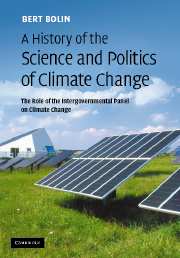 A History of the Science and Politics of Climate Change
A History of the Science and Politics of Climate Change Book contents
- Frontmatter
- Contents
- Foreword by Bo Kjellén
- Abbreviations
- Part I The early history of the climate change issue
- 1 Nineteenth-century discoveries
- 2 The natural carbon cycle and life on earth
- 3 Global research initiatives in meteorology and climatology
- 4 Early international assessments of climate change
- Part II The climate change issue becomes one of global concern
- Part III Are we at a turning point in addressing climate change?
- Some concluding remarks
- Notes
- References
- Name index
- Subject index
4 - Early international assessments of climate change
Published online by Cambridge University Press: 03 May 2010
- Frontmatter
- Contents
- Foreword by Bo Kjellén
- Abbreviations
- Part I The early history of the climate change issue
- 1 Nineteenth-century discoveries
- 2 The natural carbon cycle and life on earth
- 3 Global research initiatives in meteorology and climatology
- 4 Early international assessments of climate change
- Part II The climate change issue becomes one of global concern
- Part III Are we at a turning point in addressing climate change?
- Some concluding remarks
- Notes
- References
- Name index
- Subject index
Summary
The scientific assessments during the late 1970s and the 1980s brought the climate change issue to the attention of the UN General Assembly in 1987.
Initiation of assessments aimed at politicians and society
The first efforts to analyse climate change as a threat to humankind more specifically were made in the USA. Undoubtedly, the USA was leading the development of global climate models, particularly through the work at the Geophysical Fluid Dynamics Laboratory at Princeton, NJ, and towards the end of the 1970s some interest could be observed outside the expert groups. This was partly the result of a book published by one of the participants of the SMIC conference in Stockholm 1971 (see Schneider (1976)). Similar initiatives were not common elsewhere.
There was, however, also an early interest in Sweden because of my own involvement in global environmental issues (Bolin, 1976). I was asked by the Swedish Government in 1975 to summarise available knowledge, and later that same year it was concluded in a government bill concerning future Swedish energy policy that ‘… It is likely that climatic concerns will limit the burning of fossil fuels rather than the size of the natural resources.’
An early assessment of available knowledge regarding possible future human-induced changes of climate with the specific aim of informing a wider scientific audience was initiated by the US NAS (1977). This detailed and carefully prepared overview of the state of knowledge and recommendations for intensified research served as a basis for the US efforts for a number of years.
- Type
- Chapter
- Information
- A History of the Science and Politics of Climate ChangeThe Role of the Intergovernmental Panel on Climate Change, pp. 33 - 40Publisher: Cambridge University PressPrint publication year: 2007
